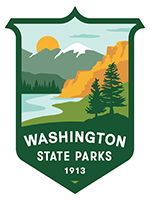Boat moorage
Many state parks on Puget Sound have moorage docks, buoys or linear moorage facilities, available for day-use and overnight visits.
Fees, rules and safety
Fees are charged year round for mooring at docks, floats, and buoys from 1 p.m. to 8 a.m.
Find current moorage fees and information about the Annual Moorage Permit.
Be prepared, review park rules and regulations before your go. Most boaters need a Boater Education Card to operate a vessel in Washington. Make sure you and your passengers stay safe on the water, review water safety best practices!
Help keep our waters clean and safe, visit PumpoutWashington.org to find public pumpout and dump station locations.
-
Buoy registration by phone
-
Parks offering phone in buoy registration
How phone registration works
When you arrive at a buoy, call the phone number on the mooring ball. Provide your buoy number and length of stay (3 nights maximum).
Pay with a credit or debit card or provide your Annual Boat Moorage permit number. There is a $4.50 convenience fee to register by phone.
-
Parks with moorage
-
San Juan Islands
Blind Island Marine State Park Obstruction Pass State Park Clark Island Marine State Park Patos Island Marine State Park Doe Island Marine State Park Spencer Spit State Park James Island Marine State Park - East and West Coves Stuart Island Marine State Park - Reid and Prevost harbors Jones Island Marine State Park Sucia Island Marine State Park - Shallow Bay, Fox Cove, Fossil Bay, Snoring Bay, Ewing Cove, and Echo Bay Matia island Marine State Park Turn Island Marine State Park Olympic Peninsula and Whidbey Island
South Sound and Hood Cannel
Columbia River
Make sure to check for alerts and current conditions at each park before heading out.
-
Parks with marina slips
-
These marina slips are reservable
Lake Chelan State Park Sun Lakes/Dry Falls State Park Lincoln Rock State Park Twenty-Five Mile Creek State Park Make sure to check for alerts and current conditions at each park before heading out.
